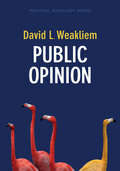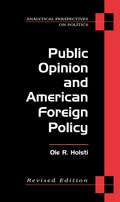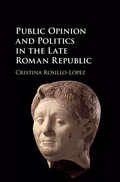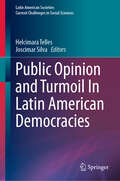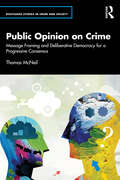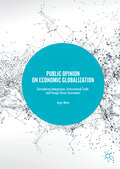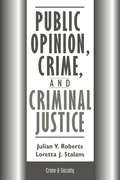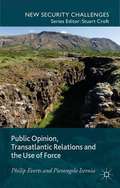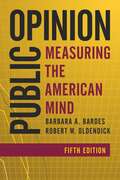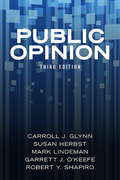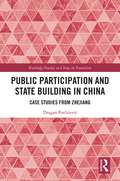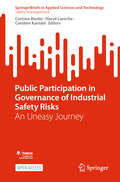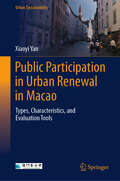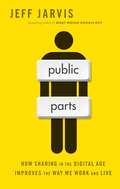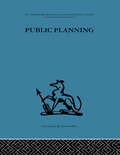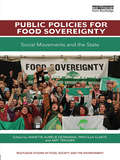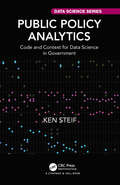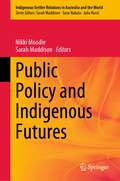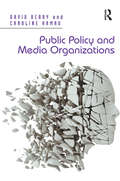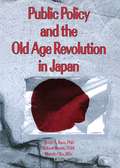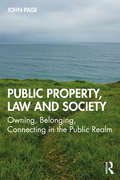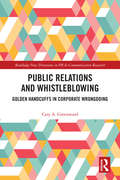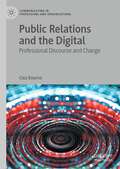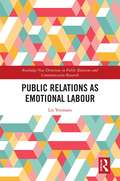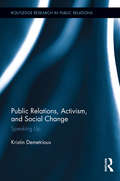- Table View
- List View
Public Opinion (Political Sociology)
by David L. WeakliemIs political polarization on the rise? Do various “populist” movements have anything in common? Is the opposition between left and right becoming obsolete and, if so, what might replace it? Many of the most pressing questions about contemporary politics involve public opinion. This incisive sociological introduction considers the formation of opinions as not just a matter of individual responses to external conditions, but as a social process in which people influence and are in turn influenced by others. David L. Weakliem illustrates how changes in economic and social conditions affect public opinion and how the distribution of opinions is shaped by the structure of interaction among people. He applies this approach to discuss topics such as political polarization, long-term trends in public opinion, and the prospects for democracy. Combining theory with up-to-date information on public opinion, the book will be of interest to researchers and students alike in sociology, political science, and communication studies.
Public Opinion and American Foreign Policy
by Ole R. HolstiThoroughly revised edition of an essential text, incorporating a wealth of new material on American foreign policy since 9/11. The second edition of this concise masterwork includes vast amounts of new material on American foreign policy in the post-9/11 era, including the war in Iraq. Holsti explores the poorly understood role of public opinion in international affairs, looking at Americans' capacity to make informed judgments about issues far removed from their personal experience. "Impressively comprehensive and current: an excellent revision of a book by the #1 authority on the topic. This new edition will remain at the forefront for consultation and textbook adoption on the topic for years to come. " -Bruce Russett, Yale University "I thought the first edition was the best single treatment of the subject-so, apparently, did the student who 'borrowed' my copy-and this is a worthy successor. The new edition almost flawlessly accomplishes the goal Holsti sets for himself: an update of his landmark book in light of emerging research and the dramatically changed state of the world that confronts U. S. foreign policy. " -Randy Siverson, University of California, Davis "For those who are curious about the impact of 9/11 on American public opinion, for serious students of the relationship between foreign policy and public opinion, for anyone who wants to understand contemporary American opinion about the United States' place in the world, and for citizens tired of conventional wisdom about a difficult and important subject, Holsti's study is not only interesting and topical, it is essential. " -Maxine Isaacs, Kennedy School of Government, Harvard University "In an age of almost weekly polling on foreign policy, Holsti's insights are indispensable. He delivers double tour de force in this new edition, providing his own current and historical research along with a comprehensive synthesis of the existing literature. His analysis of the relationships between public opinion and foreign policy since 9/11 will prove particularly valuable for students and scholars alike. " -Richard Eichenberg, Tufts University "Holsti combines a vast knowledge of political history and a mastery of the relevant scholarship with up-to-date empirical data to address the question of what role the general public can play in shaping foreign policy. This revised edition is a remarkable achievement. " -Shoon Murray, School of International Service, American University
Public Opinion and Politics in the Late Roman Republic
by Rosillo-López CristinaThis book investigates the working mechanisms of public opinion in Late Republican Rome as a part of informal politics. It explores the political interaction (and sometimes opposition) between the elite and the people through various means, such as rumours, gossip, political literature, popular verses and graffiti. It also proposes the existence of a public sphere in Late Republican Rome and analyses public opinion in that time as a system of control. By applying the spatial turn to politics, it becomes possible to study sociability and informal meetings where public opinion circulated. What emerges is a wider concept of the political participation of the people, not just restricted to voting or participating in the assemblies.
Public Opinion and Turmoil In Latin American Democracies (Latin American Societies)
by Helcimara Telles Joscimar SilvaThis book analyzes the impacts of growing political turmoil and distrust in democracy on public opinion, political communication and electoral behavior of Latin American citizens over the first two decades of the 21st century. During this period, Latin American’s young democracies, which were in the process of consolidation, have faced a number of unresolved challenges, such as growing distrust in representative institutions and the judiciary, anti-system protests, the emergence of radical right groups and the election of outsiders and populist leaders. At the same time, Latin American citizens became more suspicious of corporate communication channels and started to trust more in information from social media, while scientific denialism and support to the Armed Forces and to religious groups have also grown. The rise of new right-wing and left-wing forces in Latin America, along with the proliferation of populist leaders from various ideological camps, have produced informational reconfigurations, with the strengthening of digital social media as an important source of political information and disinformation. All these processes have deeply affected public opinion and political behavior in the region, making election campaigns more polarized, radicalized and based on false messages, while the electorate also has gone through major changes, becoming more independent of parties, less young, more religious and with a greater presence of women. Public Opinion and Turmoil in Latin American Democracies analyzes how political turbulence, sociodemographic changes and frustration with the unfulfilled promises of the democratic regimes inaugurated in the last decades of the 20th century have produced important transformations on public opinion that deeply reshaped political behavior leading to an unprecedented crisis of democracy across the region.
Public Opinion on Crime: Message Framing and Deliberative Democracy for a Progressive Consensus (Routledge Studies in Crime and Society)
by Thomas McNeilExamining the interrelationship between political rhetoric, reactionarygovernments and discriminatory ideologies, this book offers a fuller account of how our views on crime are formed.From media headlines to community groups on social media, fear of crime permeates society. At its worst, societal anxiety manifests in public demands for ever harsher approaches to punishment or the weaponising of crime by exploitative political leaders. In either case, societies are often distracted from the real factors behind crime: poverty, hardship, abuse and lack of opportunity. Many researchers and policymakers recognise this harmful spiral but struggle to answer the question: How do we create the conditions for better public debates on crime? This book explores public opinion theories highlighting a degraded civic and media debate on crime. As an antidote, the author presents evidence on how to hold better public conversations, using facts, emotion and message framing capable of shifting punitive attitudes towards a progressive consensus. It offers a unique perspective on the kinds of democratic changes needed, as well as new insight into the arguments people need to hear when discussing crime and justice. With major international elections being preoccupied with the fear of crime, this contemporary analysis comes at a very important time and presents a roadmap to a fairer society and justice system.Public Opinion on Crime will be of value to policymakers, students, third-sector leaders and academics working on criminal justice reform. It will also appeal to practitioners involved in community services who are seeking public consent for work or those leading public consultations on behalf of public authorities at the local and national levels.
Public Opinion on Economic Globalization
by Roger WhiteThis book examines survey data to consider the extent to which public support for immigration, international trade, and foreign direct investment exists in a cohort of 38 heterogeneous countries. With economic globalization shaping daily life, understanding the determinants of public opinion is crucial for policy makers. This timely volume uses survey data from the Pew Research Center's 2006-2014 Global Attitudes Project (GAP) in conjunction with data from several secondary sources. White identifies the factors that underlie the reluctance of some members of the public, and some societies, to view these topics in a more positive light. Specifically, he considers the roles of culture, cultural differences ("cultural distance"), and relative social and economic development as determinants of public opinion and corresponding cross-societal differences of opinion.
Public Opinion, Crime, and Criminal Justice: Public Opinion In England And Wales (Crime and Society)
by Julian RobertsTaking on one of the most popular issues of the day—crime and the way we make sense of it—Julian Roberts and Loretta Stalans reveal the mismatch between the public perception of crime and the reality of crime statistics. Discussing such issues as public knowledge of crime, sources of crime information, information processing by the public, public attitudes about crime, and the effectiveness of punishment, this book considers the role that public opinion plays in the politics of criminal justice issues. Based on extensive data from the United States, with comparisons with Canada and the United Kingdom, Roberts and Stalans reveal the truth behind how the public perceives crime and how this perception compares to actual criminal activity.
Public Opinion, Transatlantic Relations and the Use of Force
by Philip Everts Pierangelo IserniaThis book explores the intersection of the study of transatlantic relationships and the study of public support for the use of force in foreign policy. It contributes to two important debates: one about the nature of transatlantic partnership, and another about the determinants of support for the use of military force in a comparative perspective.
Public Opinion: Measuring the American Mind
by Barbara Bardes Robert OldendickPublic Opinion: Measuring the American Mind provides an in-depth look at the history and future of polling, including how public opinion is measured, how it is used and misused, and how to critically evaluate public opinion data. This new edition incorporates a new theme of political polarization and examines how mass media and social media help to shape public opinion. It also provides in-depth coverage of public opinion on such issues as political ideology, health care, race, and foreign policy, as well as an update and discussion of the major changes that have taken place on controversial issues such as gay marriage, gun control, and immigration.
Public Opinion: Third Edition
by Susan Herbst Carroll J. Glynn Robert Y. Shapiro Mark Lindeman Garrett J. O'KeefePublic Opinion is a comprehensive and multidisciplinary examination of public opinion in the United States. Drawing on scholarship in political science, psychology, sociology, and communications, the authors explore the nature of political and social attitudes in the United States and how these attitudes are shaped by various institutions, with an emphasis on mass media. The book also serves as a provocative starting point for the discussion of citizen moods, political participation, and voting behavior. Feature boxes and illustrations throughout help students understand all aspects of the elusive phenomenon we call public opinion. The third edition has been thoroughly revised and updated to reflect how public opinion is studied today, and to incorporate current data and debates. The book now contains two revised and reframed theory chapters--"Group Membership and Public Opinion” and "Public Opinion and Social Process”--as well as new coverage of the influence of online and social media on public opinion, especially in issue opinions and campaigns.
Public Participation and State Building in China: Case Studies from Zhejiang (Routledge Studies on China in Transition)
by Dragan PavlićevićThis book explores non-electoral means of public participation in contemporary China, both as an outcome of and a key contributor to the party-state’s efforts to improve its governing capacity. Examining consultative meetings, public hearings, and the use of surveys and questionnaires in Zhejiang province, on an empirical level, the study evaluates the historical development and institutional backgrounds of these mechanisms, as well as provides a critical assessment of their achievements and failures. At the same time, on a theoretical level, this book contributes to the broader scholarship on contemporary Chinese politics and political development within one-party regimes, as well as debates about state building and democratisation. Relying on the distinction between access to and exercise of power, it concludes that non-electoral public participation is in fact a function of state building. Developing a state capable of producing effective solutions to governing challenges, it is argued, requires public participation in the governing process. With analysis informed by interviews with local-level policy-makers and officials, academics, and citizens’ representatives and activists, Public Participation and State Building in China will be a valuable research resource for students and scholars of Chinese politics, political science, and civil society.
Public Participation in Governance of Industrial Safety Risks: An Uneasy Journey (SpringerBriefs in Applied Sciences and Technology)
by Corinne Bieder Hervé Laroche Caroline KamatéThis open access book contributes to the increasing trend toward greater public participation in decision-making in many areas of public life, particularly in the field of the environment and sustainable development. It describes the outcome of a two-day workshop, organized by the Foundation for an Industrial Safety Culture in 2023, that addresses the continuing sensitivities surround the impact of hazardous industrial activities. Public Participation in Governance of Industrial Safety Risks brings together international academic experts as well as industrial and institutional representatives to shed light on the topics discussed during this workshop. Through the viewpoints of experts from various disciplines, industrial sectors, and countries, it offers an opportunity to gain a better grasp of the multiplicity and complexity of participatory processes and to understand their expected benefits, their drawbacks, and potential pitfalls. The work supports the making of better-informed decisions, especially by industrial or regulatory actors, to engage or not with public participation.
Public Participation in Urban Renewal in Macao: Types, Characteristics, and Evaluation Tools (Urban Sustainability)
by Xiaoyi YanThis book analyses of public participation in the different development stages of urban renewal in Macao. Three types of participation are summarized from practice, analyzed their characteristics. And then develops a framework and a set of standards of participation quality evaluation that are applicable to Macao. Through a case study of public consultation meeting on Macao Urban Renewal Legal System, the participation quality of government-led public participation was evaluated. Finally, the applicability of the evaluation framework and standards was discussed. This book enriches the existing theories, and it provides new experience and the cases of public participation in urban renewal. Public participation in a new local context with multicultural and strong social connections was discussed. It builds the systems theoretical foundation on this field in Macao. It is a useful book for graduate students and the researcher in the academic field of urban renewal or urban governance to understand the public participation in urban renewal theory. This book can provide references for the government, associations, and private individuals to initiate and carry out public participation activities. It could provide decision-makers and researchers in Macao a reference for the quality evaluation of public participation.
Public Parts
by Jeff JarvisA visionary and optimistic thinker examines the tension between privacy and publicness that is transforming how we form communities, create identities, do business, and live our lives.Thanks to the internet, we now live--more and more--in public. More than 750 million people (and half of all Americans) use Facebook, where we share a billion times a day. The collective voice of Twitter echoes instantly 100 million times daily, from Tahrir Square to the Mall of America, on subjects that range from democratic reform to unfolding natural disasters to celebrity gossip. New tools let us share our photos, videos, purchases, knowledge, friendships, locations, and lives.Yet change brings fear, and many people--nostalgic for a more homogeneous mass culture and provoked by well-meaning advocates for privacy--despair that the internet and how we share there is making us dumber, crasser, distracted, and vulnerable to threats of all kinds. But not Jeff Jarvis.In this shibboleth-destroying book, Public Parts argues persuasively and personally that the internet and our new sense of publicness are, in fact, doing the opposite. Jarvis travels back in time to show the amazing parallels of fear and resistance that met the advent of other innovations such as the camera and the printing press. The internet, he argues, will change business, society, and life as profoundly as Gutenberg's invention, shifting power from old institutions to us all.Based on extensive interviews, Public Parts introduces us to the men and women building a new industry based on sharing. Some of them have become household names--Facebook's Mark Zuckerberg, Google's Eric Schmidt, and Twitter's Evan Williams. Others may soon be recognized as the industrialists, philosophers, and designers of our future. Jarvis explores the promising ways in which the internet and publicness allow us to collaborate, think, ways--how we manufacture and market, buy and sell, organize and govern, teach and learn. He also examines the necessity as well as the limits of privacy in an effort to understand and thus protect it. This new and open era has already profoundly disrupted economies, industries, laws, ethics, childhood, and many other facets of our daily lives. But the change has just begun. The shape of the future is not assured. The amazing new tools of publicness can be used to good ends and bad. The choices--and the responsibilities--lie with us. Jarvis makes an urgent case that the future of the internet--what one technologist calls "the eighth continent"--requires as much protection as the physical space we share, the air we breathe, and the rights we afford one another. It is a space of the public, for the public, and by the public. It needs protection and respect from all of us. As Secretary of State Hillary Clinton said in the wake of the uprisings in the Middle East, "If people around the world are going to come together every day online and have a safe and productive experience, we need a shared vision to guide us." Jeff Jarvis has that vision and will be that guide.
Public Planning: The inter-corporate dimension (Routledge Revivals Ser.)
by John Friend J. M. Power C. J. YewlettTavistock Press was established as a co-operative venture between the Tavistock Institute and Routledge & Kegan Paul (RKP) in the 1950s to produce a series of major contributions across the social sciences. This volume is part of a 2001 reissue of a selection of those important works which have since gone out of print, or are difficult to locate. Published by Routledge, 112 volumes in total are being brought together under the name The International Behavioural and Social Sciences Library: Classics from the Tavistock Press. Reproduced here in facsimile, this volume was originally published in 1974 and is available individually. The collection is also available in a number of themed mini-sets of between 5 and 13 volumes, or as a complete collection.
Public Policies for Food Sovereignty: Social Movements and the State (Routledge Studies in Food, Society and the Environment)
by Priscilla Claeys Annette Aurelie Desmarais Amy TraugerAn increasing number of rural and urban-based movements are realizing some political traction in their demands for democratization of food systems through food sovereignty. Some are pressuring to institutionalize food sovereignty principles and practices through laws, policies, and programs. While the literature on food sovereignty continues to grow in volume and complexity, there are a number of key questions that need to be examined more deeply. These relate specifically to the processes and consequences of seeking to institutionalize food sovereignty: What dimensions of food sovereignty are addressed in public policies and which are left out? What are the tensions, losses and gains for social movements engaging with sub-national and national governments? How can local governments be leveraged to build autonomous spaces against state and corporate power? The contributors to this book analyze diverse institutional processes related to food sovereignty, ranging from community-supported agriculture to food policy councils, direct democracy initiatives to constitutional amendments, the drafting of new food sovereignty laws to public procurement programmes, as well as Indigenous and youth perspectives, in a variety of contexts including Brazil, Ecuador, Spain, Switzerland, UK, Canada, USA, and Africa. Together, the contributors to this book discuss the political implications of integrating food sovereignty into existing liberal political structures, and analyze the emergence of new political spaces and dynamics in response to interactions between state governance systems and social movements voicing the radical demands of food sovereignty.
Public Policy Analytics: Code and Context for Data Science in Government (Chapman & Hall/CRC Data Science Series)
by Ken SteifPublic Policy Analytics: Code & Context for Data Science in Government teaches readers how to address complex public policy problems with data and analytics using reproducible methods in R. Each of the eight chapters provides a detailed case study, showing readers: how to develop exploratory indicators; understand ‘spatial process’ and develop spatial analytics; how to develop ‘useful’ predictive analytics; how to convey these outputs to non-technical decision-makers through the medium of data visualization; and why, ultimately, data science and ‘Planning’ are one and the same. A graduate-level introduction to data science, this book will appeal to researchers and data scientists at the intersection of data analytics and public policy, as well as readers who wish to understand how algorithms will affect the future of government.
Public Policy and Indigenous Futures (Indigenous-Settler Relations in Australia and the World #4)
by Sarah Maddison Nikki MoodieThis book focuses on Indigenous self-determined and community-owned responses to complex socioeconomic and political challenges in Australia, and explores Indigenous policy development and policy expertise. It critically considers current practices and issues central to policy change and Indigenous futures. The book foregrounds the resurgence that is taking place in Indigenous governing and policy-making, providing case studies of local and community-based policy development and implementation. The chapters highlight new Australian work on what is an international phenomenon.This book brings together senior and early career political scientists and policy scholars, and Indigenous and non-Indigenous scholars working on problems of Indigenous policy and governance.
Public Policy and Media Organizations
by David Berry Caroline KamauPublic policy thinking and implementation is both a process of intellectual thought and rationale for governing. This book examines public policy and the influence news media organizations have in the production and implementation of public policy. Part I assesses the impact of political philosophy on public policy thinking and further discusses the meaning of public policy in social democratic systems. It uses the riots that occurred across England in the summer of 2011 as a case-study to focus on how the idea of the ’Big Society’ was regenerated by government and used as a basis for public policy thinking. Finally, it investigates how media organizations form news representations of public policy issues that seek to contextualize and reshape policy manufactured for public consumption. Part II provides a psychological exploration of the processes which explain the connection between the media, the public and policy-makers. Does the ’common good’ really drive public policy-making, or can group processes better explain what policy-makers decide? This second part of the book explores how media workers’ professional identities and practices shape their decisions about how to represent policy news. It also shows how the public identities and corporate interests of media organizations shape their role as referees of public policy-making and how all this culminates in faulty decision-making about how to represent policy news, polarization in public opinion about particular policies, and shifts in policy-makers’ decisions.
Public Policy and the Old Age Revolution in Japan
by Robert Morris *Deceased* Scott Bass Masato Oka Jill NortonThirty years ago, when compared to the U.S., England, France, and Sweden, Japan had the lowest life expectancy for males and females. Today, Japan has the highest life expectancy and is the world’s most rapidly aging society. Public Policy and the Old Age Revolution in Japan captures the vitality of Japanese policymakers and the challenges they face in shaping a modern society responding to its changing needs. The rapid transition to an aging society poses a set of complex policy and resource dilemmas; the responses taken in Japan are of great value to policymakers, professionals, and students in the fields of gerontology, Asian and Japanese studies, sociology, public policy, administration and management, and anthropology in other industrial aging societies. Readers of Public Policy and the Old Age Revolution in Japan will discover the array of social and economic implications that comes with an increasingly aged society. Such a change in demographics affects pension expenditures and pension contributions, capital formation and savings rates, health costs, service systems, tax bases, labor pools, career counseling, training, advertising, and marketing. This book does not stop with these topics, however. Readers also learn about: how older Japanese workers are staying employed and employable policies in Japan for a smooth transition from work to retirement Japan’s Silver Human Resource Centers the new direction of health services in Japan the Japanese financing system for elderly health care the expansion of formalized in-home services for Japan’s aged Japanese housing policy and the concept of universal design the Gold Plan, a comprehensive ten-year plan to promote health care and welfare for the aged the concept of ikigai--promoting feelings of purpose and self-worth in the agedPublic Policy and the Old Age Revolution in Japan is one of only a handful of books prepared in English by American and Japanese authors for an international audience about aging and social policy in Japan. The book’s recent collection of articles by leading scholars on the subject makes it a unique and timely source of information. Above all, Public Policy and the Old Age Revolution in Japan makes it clear that the rest of the world has many valuable lessons to learn by studying Japan’s approach to its rapidly aging society.
Public Property, Law and Society: Owning, Belonging, Connecting in the Public Realm
by John PageThis book examines the almost entirely neglected realm of public property, identifying and describing a number of key organizing principles around which a nascent jurisprudence of public property may be developed. In property law terms, the public realm is lost to plain view. Despite the vast acreage of public lands, or the extensive tracts of private lands over which public rights subsist, there is little commensurate scholarly discussion of the ideas, theories, practices, and laws of public property. This is no accident. Public property has been marginalized and pushed to the periphery for centuries, a consequence of the dominant discourse of private property, and its enclosing, encroaching tendencies. This book explores the rich diversity of the public estate, of what the public realm means for us, the general public, canvassing what we may ‘own’, where we may ‘belong’, or not, and how we may ‘connect’ through a shared use and enjoyment of public place and space. To better understand public property is to better value its critical public-wealth. Whether overlooked, over-used, or under threat of imminent loss, this book maintains that our loved (and not so loved) public spaces are essential components of our diverse, functioning, and optimistically livable human geographies. As such, they demand legal protection. This important and original book will be of considerable interest to scholars and others with interests in property and land law, socio-legal studies, legal geography and urban studies.
Public Relations and Whistleblowing: Golden Handcuffs in Corporate Wrongdoing (Routledge New Directions in PR & Communication Research)
by Cary A. GreenwoodThere is a growing interest in corporate whistleblowing, but no comprehensive research has yet focused on public relations practice. Drawing on extensive research on Fortune 1000 and Wilshire 5000 corporations, this book reveals executives’ attitudes and relationships toward their organizations and their impact on whistleblowing. Perhaps unsurprisingly, it reveals that wrongdoing in corporations and the privileges of power coexist. Top-ranking public relations executives, who are mostly white and male, are more likely to be aware of wrongdoing but no more likely to blow the whistle, fundamentally due to their positive relationship with their employers. Using the new lens of evolutionary theory, this study explains whistleblowing, retaliation, and relationships, and in the light of the connection between whistleblowing behavior and executives’ attitudes, it proposes a new theory of the phenomenon of Golden Handcuffs. As public attitudes to corporations, corporate social responsibility (CSR), and transparency harden, these findings have serious implications for companies globally. Researchers, scholars, and advanced students in public relations, organizational communication, corporate communication, strategic communication, corporate reputation, and CSR will find this book full of revealing insights.
Public Relations and the Digital: Professional Discourse and Change (Communicating in Professions and Organizations)
by Clea BourneThis book takes a people-centred approach to the ever-fluid and rapidly-transforming professional world of public relations (PR) in the age of digital platforms. As everyday PR work becomes increasingly shaped by the platform economy, this is transforming how the PR profession talks about itself, its issues and concerns. Drawing on different textual genres and discursive strategies, the author examines the shifting boundaries between PR and adjacent fields such as advertising, marketing and journalism – and illuminates varied lifeworlds of PR professionals from different backgrounds, races and genders. Written for academics, practitioners and those interested in the world of public relations, the book will also be enjoyed by young professionals working in this interesting and fast-changing occupation.
Public Relations as Emotional Labour: TBC (Routledge New Directions in PR & Communication Research)
by Liz YeomansInextricably linked to neoliberal market economies, public relations’ influence in our promotional culture is profound. Yet many aspects of the professional role are under-researched and poorly understood, including the impact on workers who construct displays of feeling to elicit a desired emotional response, to earn trust and manage clients. The emotionally demanding nature of this aspirational work, and how this is symptomatic of "always on" culture, is particularly overlooked. Drawing on interviews with practitioners and agency directors, together with the author’s personal insights from observations in the field, this book fills a significant gap in knowledge by presenting a critical-interpretive exploration of everyday relational work of account handlers in PR agencies. In underscoring the relationship-driven, highly contingent nature of this work, the author shows that emotional labour is a defining feature of professionalism, even as public relations is reconfigured in the digital age. In doing so, the book draws on a wide range of related contemporary social and cultural theories, as well as critical public relations and feminist public relations literature. Scholars, educators and research students in PR and communications studies will gain rich insights into the emotion management strategies employed by public relations workers in handling professional relationships with clients, journalists and their colleagues, thereby uncovering some of the taken-for-granted aspects of this gendered, promotional work.
Public Relations, Activism, and Social Change: Speaking Up (Routledge Research in Public Relations)
by Kristin DemetriousWinner of the 2014 NCA PRIDE Book Award Why are some voices louder in public debates than others? And why can’t all voices be equally heard? This book draws significant new meaning to the inter-relationships of public relations and social change through a number of activist case studies, and rebuilds knowledge around alternative communicative practices that are ethical, sustainable, and effective. Demetrious offers a powerful critical description of the dominant model of public relations used in the twentieth century, showing that ‘PR’ was arrogant, unethical and politically offensive in ways that have severely weakened democratic process and its public standing and professional credibility. The book argues that change within the field of public relations is imminent and urgent—for us all. As the effects of climate change intensify, and are magnified by high carbon dioxide emitting industries, vigorous public debate is vital in the exploration of new ideas and action and if alternative futures are to be imagined. In these conditions, articulate and persistent publics will appear in the form of grassroots activists, asking contentious questions about risks and tabling them for public discussion in bold, inventive, and effective ways. Yet the entrenched power relations in and through public relations in contemporary industrialized society provide no certainty these voices will be heard. Following this path, Demetrious theorises an alternative set of social relations to those used in the twentieth century: public communication. Constructed from communicative practices of grassroots activists and synthesis of diverse theoretical positions, public communication is a principled approach that avoids the deep contradictions and flawed coherences of essentialist public relations and instead represents an important ethical reorientation in the communicative fields. Lastly, she brings original new perspectives to understand current and emergent developments in activism and public relations brought about through the proliferation of Internet and digital cultures.
